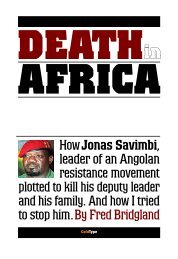UPDATED - ColdType
UPDATED - ColdType
UPDATED - ColdType
- TAGS
- updated
- coldtype
- coldtype.net
You also want an ePaper? Increase the reach of your titles
YUMPU automatically turns print PDFs into web optimized ePapers that Google loves.
oadcast industry are now seeking, including<br />
rules that will determine the future of broadband<br />
and the Internet.”<br />
The scene at the U.N.<br />
I WAS back at the U.N. yesterday, covering the<br />
coverage of the Security Council as it occurred,<br />
watching the many TV crews from all over the<br />
hold their “stake outs” to catch the 20 seconds it<br />
took for Kofi Annan to leave the elevator. There<br />
was chief weapons inspector Hans Blix reporting<br />
on his work plan, when everyone knew that his<br />
moment – and perhaps the U.N.’s moment – has<br />
come and gone, at least for now.<br />
“Europe is on Venus, the U.S. is on Mars, and<br />
the U.N. is over the moon” is how one British<br />
journalist put it to me. Another spoke of the<br />
“buzz” and sense of possibility that existed<br />
months ago, when the arms inspection process<br />
got underway. The U.N. was created to foster<br />
peace. It did not fail so much as it too was<br />
“decapitated” by the world’s No. 1 superpower,<br />
which took its marbles and went home. One<br />
watched with disbelief as various diplomats<br />
talked to themselves and none condemned what<br />
is likely to occur, or the U.S. role.<br />
Ian Williams reported: “Reality intruded,<br />
briefly, in the form of U.N. Secretary General<br />
Kofi Annan, who addressed the Security Council<br />
to remind belligerents of their responsibility for<br />
the protection of civilians. “Without in any way<br />
assuming or diminishing that ultimate responsibility,<br />
we in the United Nations will do whatever<br />
we can to help,” Annan said. The Iraqi Ambassador<br />
sensed the “tragic irony of people talking<br />
about reconstruction aid for a country that they<br />
are in effect, allowing to be blown apart.”<br />
MOBILIZING OPINION<br />
101<br />
J’accuse<br />
THE French Ambassador, the smooth-talking silver-haired<br />
Dominique came out to make nice<br />
with the press. All the U.N. correspondents<br />
started shouting at once, hurling questions his<br />
way. “Do you think the criticisms of France are<br />
unfair?” Duh. Yes, of course, he does, etc., etc. I<br />
caught the eye of a U.N. man picking the questioners.<br />
My hand shot up, and to my surprise, I<br />
was called upon. I asked him what it means for<br />
the U.N. if one nation can make war against the<br />
U.N. Charter. He paused, sidestepped the adversarial<br />
nature of the question, but then expressed,<br />
in most passionate terms, why the U.N. matters.<br />
I thought at that moment of how little coverage<br />
there is of the U.N. in the U.S., except when<br />
Washington is using it or denouncing it.<br />
Why did the U.N. cave?<br />
MANY in the peace movement had put their faith<br />
in the U.N., and its inspection process. But when<br />
the U.S. demanded that the inspectors leave, the<br />
U.N. deferred in a quick second, without any<br />
resistance, even verbal, all in the name of staff<br />
safety. Could it have done more? Jan Oberg of<br />
the TFF in Sweden thought so:<br />
“Thus, it seems that one member issues an<br />
ultimatum recommendation and the U.N. obeys<br />
and leaves the Iraqi people behind to be intimidated,<br />
humiliated, killed, wounded and, in a few<br />
weeks, starve. Article 99 of the U.N. Charter<br />
states that the Secretary-General may bring to<br />
the attention of the Security Council any matter<br />
that in his opinion may threaten the maintenance<br />
of international peace and security.<br />
“Is that not exactly what the U.S. ultimatum did

















